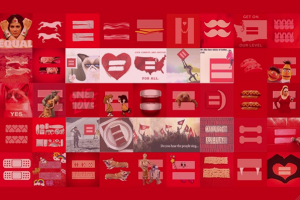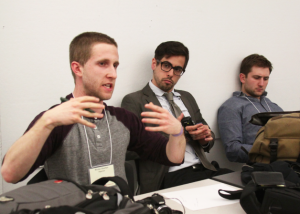Activism Takes a Digital Turn
Outside a Chelsea pet shop, middle schoolers picketed against the store’s alleged use of puppy mills. Most pedestrians ignored them, but not Cecily McMillan. Standing outside a neighboring restaurant with a cigarette in her hand, McMillan — an Occupy Wall Street activist and New School for Social Research alumnus — touts the protesters’ willingness to hit the streets in a time of vast Internet activism.
The term “slacktivism” — a combination of the words “slacker” and “activism”— is an emerging form of protest that includes Internet petitions, social media profile picture changes and status updates. Following March’s Supreme Court hearings for and against the Defense of Marriage Act and California’s Proposition 8, roughly 2.7 million Facebook users changed their Facebook profile pictures to the pink-on-red equals sign advocated by the Human Rights Campaign. The move raised a question: Has “slacktivism” replaced protest signs, sit-ins and marches in political effectiveness?

The author of Tumblr blog “Clever Title TBA,” on condition of anonymity, has castigated Internet-based activism. He criticizes the Human Rights Campaign for misusing its donation funds and for opposing transgender rights.
“Its vision of ‘equality’—as obviously signaled by its logo—is not, and never has been, equality for all. Either you know nothing about the HRC and posted the photo without bothering to ask any questions about what actual cause you were supporting, or you know about the HRC, and its policies, and you posted the photo anyway.”
But McMillan, who was jailed during the Occupy protests in Fall 2011, feels that slacktivism alone is not enough to affect policy decisions.
“Social movement theory says that even if a large number of population is in support of a cause, that does not equal political change,” said McMillan, who was jailed during the Occupy protests. “Applying [grassroots] pressure and leverage makes social change.”
Occupy Wall Street exemplified social media’s political leverage. During the heights of the protests, some “slacktivists” aligned themselves with the movement without marching or holding picket signs.
“Activism has to be engaging both in physical public spaces and online,” said Nitin Sawhney, Associate Professor of Media Studies at The New School, who works with Occupy Data Hackathons. “I think people who are doing social justice work in physical spaces in their communities are also using online tools to organize and do advocacy,” Sawhney added.
For many activists, the present conundrum is turning slacktivists into social media savvy activists.
The current young generation, those between 18-35 years old, are widely considered the most socially progressive generation. In 2011, about 71 percent of college freshmen claimed to support same-sex marriage; in 1997, only half of college freshmen made that same argument, according to an annual report conducted by the Cooperative Institutional Research Program at University of California, Los Angeles’ Higher Education Research Institute.
But fewer college freshmen formally assist political campaigns. According to the UCLA study, only 10 percent of those surveyed said they worked on a political campaign in the last year, compared to as much as 15 percent over the past 40 years.
“Changing our profile pictures won’t really do anything,” said Lang freshman Laura Malagon, who organizes Universities for the New Economy, a New School-based organization promoting economic education. “Being an active member of a political system and town halls is good. We need to do that instead.”
Only half of registered 18-to-29-year-old, or Millennial, voters cast their ballots last November, according to the National Conference on Citizenship. The statistic remains virtually unchanged since 2008.

But the amount of people using social media to promote political material is climbing. According to a 2012 Pew study, 44 percent of Millennial’s on social media click “like” on politics-related posts. Roughly 42 percent of those surveyed do so to express their political identities, while about 36 percent hope that doing so will encourage their “friends” and followers to act.
Despite these digital trends, Millennials still carry grassroots clout. They volunteer and participate in community service more than their parents at the same age, according to the 2013 NCoC report. And some of the students interviewed gave community organizing, not working on political campaigns, as their form of activism.
Since the 1960s, when students helmed America’s Civil Rights Movement, activism has changed. Internet-based activists are considerably less likely to get arrested for airing their political beliefs.
“A school is still a business and will be [somewhat] conservative,” Lang senior and environmental activist Gemma Richardson told the Free Press. “You can be expelled or given a restraining order [for protesting in public spaces].”
McMillan, whose activism has extended past her time at The New School, thinks grassroots activism and its online counterpart can work together in the future.
“[Slacktivism] is the bridge,” McMillan said. “We will have generations of people who will see organizing as a way of life. When you have enough people living like that, society changes.”
With reporting by Francia Sandoval







